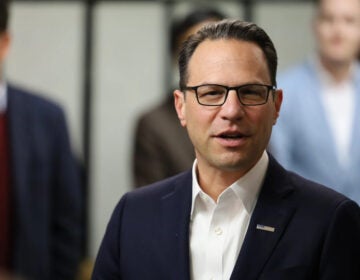How Philadelphia women are still working to close the gender pay gap
Data shows that, across multiple factors, the pay gap between men and women still persists, even in big cities like Philadelphia.
Listen 1:03
The Philadelphia skyline. (Kimberly Paynter/WHYY)
From Philly and the Pa. suburbs to South Jersey and Delaware, what would you like WHYY News to cover? Let us know!
More than 60 years after Congress passed the federal law known as the Equal Pay Act, employers are still legally allowed to pay women and men unequal wages for equal work — so long as any disparities are explained by factors such as seniority or merit.
To help employers interested in addressing pay equity issues inside organizations, as well as employees pushing for change, the Forum of Executive Women in Philadelphia crafted its annual pay equity report to act as a guide for change.
“Our members are women who run Philadelphia’s top companies. So this issue really hits home, not just for our members but for the regional economy,” said Meghan Pierce, CEO of the Forum of Executive Women, an organization founded in 1977. “The report is an attempt to offer solutions about the issue and help shed some light because it’s not very straightforward.”
One piece of advice in the report is to make sure there’s a board member-level agreement about a company or nonprofit’s strategic goals around salaries and pay equity, Pierce said.
“Compensation philosophy, basically saying what you believe about pay as an organization, and that really has to start from the top down. If there’s that board-level buy-in then there’s going to be, you know, hopefully, the necessary executive team buy-in that will eventually trickle down,” she said. “Not only can employees advocate for transparency at their workplace, but there’s also policies.”
Employer transparency and paid leave
In recent years there’s been political pressure, especially on corporations, to become more transparent about salaries — such as laws on the books that require listed compensation in job postings like in Colorado and New York.
Pierce said one step toward equality is pay transparency, and that often that’s done up front by posting salary ranges in job descriptions. The group hosted a LinkedIn live coffee chat to discuss the topic in mid-July.
In both Philadelphia and nearby Lehigh County, employers are prohibited from asking potential applicants about their salary history as an anti-discrimination ordinance.
But much legislation sought at the state level in Pennsylvania, such as paid family leave, has stalled in the Republican-controlled Senate, often over whether the system would be a tax or tax credit.
Delaware County state Rep. Jennifer O’Mara remembers when she was advocating for an equal pay bill in the Pennsylvania House of Representatives, there was pushback about the gender pay gap.
“When we were pushing the equal pay bill through the House, one of my colleagues actually said that, you know, women get paid less because they’re nurses and caregivers and men are engineers and that’s why they get paid more,” O’Mara said during the recent LinkedIn live discussion. “That answer infuriated me on so many levels. But the reality was he wasn’t far from the truth. The real problem is that it’s because women tend to be forced into caregiving roles in our society and it forces them to make decisions around their career that they may not otherwise. Beyond the child-bearing aspect … women are often taking care of parents, sick family members, children.”
The Forum of Executive Women is a nonpartisan membership organization, so it doesn’t endorse legislation; instead, it seeks to educate members, Pierce said.
“There’s little things that counties and municipalities can do, but at the state level we need a much more holistic look at it, paid family leave, that’s a huge part of the gender pay gap,” Pierce said. “Socially we just don’t value the act of caregiving and we don’t recognize how much caregivers are impacted.”
The gender pay gap
Over the tenure of a career, the gender pay gap often widens, according to the report, which used a variety of data sources, including the U.S. Census.
For women between the ages of 25 and 34, pay is about 5% lower than for men of the same age. But by 35 years old, the gap widens to between 17% and 20%.
“Women, particularly when they enter the workforce following college, start on an even playing field, and then as they advance their career, they’re forced to make that really challenging decision between work and family, and that’s when the gap starts to widen,” Pierce said.
A further analysis by WHYY News of 2023 full-time earnings (adjusted for inflation) estimated by the U.S. Census in Philadelphia shows that, across nearly all races and ethnicities, median pay was higher for men than women. However, Asian women earned marginally more than Asian men.
For example, the full-time median pay for non-Hispanic or Latina white women in Philadelphia was $72,521 in 2023. That’s 94 cents for every $1 earned by non-Hispanic or Latino white men across the city.
By comparison, for every $1 earned by non-Hispanic or Latino white men, Asian women earned 80 cents, Black women earned 64 cents and Hispanic or Latina women earned 57 cents.
Across Pennsylvania, in 2023, the median pay for non-Hispanic or Latina white women who worked full-time was $55,440, when adjusted for inflation. That’s 74 cents for every $1 earned by non-Hispanic or Latino white men statewide. The gap widens for Asian, Black and Latina or Hispanic women on the state level to 84 cents, 63 cents and 55 cents, respectively.
Nationwide, the median pay for non-Hispanic or Latina white women who worked full-time was $57,291, compared to $71,994 for non-Hispanic or Latino white men. The same trend across race and ethnicity found at the state and city level continued at the national level.
Trump changes
During President Donald Trump’s second term, there has been pressure on businesses, nonprofits, government contractors, universities and municipalities to eliminate diversity, equity and inclusion programs.
Even private employers that have prioritized diversity and inclusion efforts, such as Philadelphia law firm Morgan Lewis & Bockius LLP, have been tapped to answer questions about hiring practices by the Trump administration’s Equal Employment Opportunity Commission.
As a result, some companies are changing their language around pay equity, leaning into the concept that it’s a smart, market-driven decision to diversify teams.
“The significant competitive advantage that businesses can have with pay transparency, you’re going to see improved retention … improved productivity, and trust and morale,” Pierce said.

Get daily updates from WHYY News!
WHYY is your source for fact-based, in-depth journalism and information. As a nonprofit organization, we rely on financial support from readers like you. Please give today.







